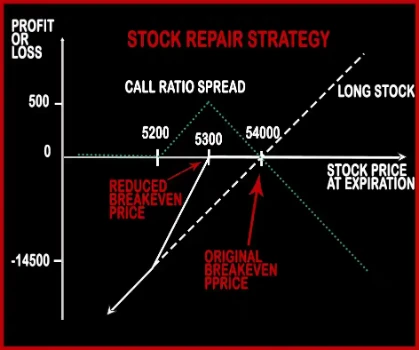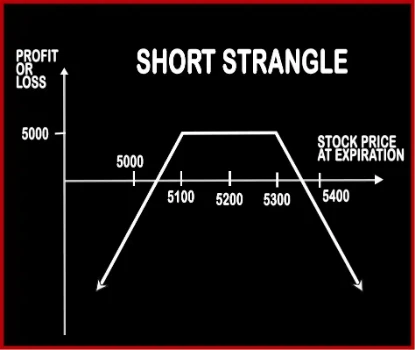Compare Strategies
| STOCK REPAIR | SHORT STRANGLE | |
|---|---|---|

|

|
|
| About Strategy |
Stock Repair Option StrategyStock Repair Strategy is used to cover up for losses made on long stock position. After the long position suffered losses on stock price fall, a trader will implement this strategy in order to bring down the breakeven price and capping his further losses thereby increasing his probability of loss recovery. Suppose Mr. X has |
Short Strangle Option StrategyThis strategy is similar to Short Straddle; the only difference is of the strike prices at which the positions are built. Short Strangle involves selling of one OTM Call Option and selling of one OTM Put Option, of the same expiry date and same underlying asset. Here the probability of making profits is more as there is a spread between the two strike prices, and if .. |
STOCK REPAIR Vs SHORT STRANGLE - Details
| STOCK REPAIR | SHORT STRANGLE | |
|---|---|---|
| Market View | Bullish | Neutral |
| Type (CE/PE) | CE (Call Option) | CE (Call Option) + PE (Put Option) |
| Number Of Positions | 3 | 2 |
| Strategy Level | Beginners | Advance |
| Reward Profile | Unlimited | Limited |
| Risk Profile | Limited | Unlimited |
| Breakeven Point | Lower Break-even = Strike Price of Put - Net Premium, Upper Break-even = Strike Price of Call+ Net Premium |
STOCK REPAIR Vs SHORT STRANGLE - When & How to use ?
| STOCK REPAIR | SHORT STRANGLE | |
|---|---|---|
| Market View | Bullish | Neutral |
| When to use? | Stock Repair Strategy is used to cover up for losses made on long stock position. After the long position suffered losses on stock price fall, a trader will implement this strategy in order to bring down the breakeven price and capping his further losses thereby increasing his probability of loss recovery. | This strategy is perfect in a neutral market scenario when the underlying is expected to be less volatile. |
| Action | Buy 1 ATM Call, Sell 2 OTM Calls | Sell OTM Call, Sell OTM Put |
| Breakeven Point | Lower Break-even = Strike Price of Put - Net Premium, Upper Break-even = Strike Price of Call+ Net Premium |
STOCK REPAIR Vs SHORT STRANGLE - Risk & Reward
| STOCK REPAIR | SHORT STRANGLE | |
|---|---|---|
| Maximum Profit Scenario | Maximum Profit = Net Premium Received | |
| Maximum Loss Scenario | Loss = Price of Underlying - Strike Price of Short Call - Net Premium Received | |
| Risk | Limited | Unlimited |
| Reward | Unlimited | Limited |
STOCK REPAIR Vs SHORT STRANGLE - Strategy Pros & Cons
| STOCK REPAIR | SHORT STRANGLE | |
|---|---|---|
| Similar Strategies | Short Straddle, Long Strangle | |
| Disadvantage | • Management required with all the positions. • Additional loss due to continuous decline in shares as downside risk remains unchanged. | • Unlimited loss is associated with this strategy, not recommended for beginners. • Limited reward amount. |
| Advantages | • This strategy creates an opportunity to recover losses by lowering our breakeven. • No margin required. • No additional downside risk and costs nothing to put on. | • Higher chance of profitability due to selling of OTM options. • Advantage from double time decay and a contraction in volatility. • Traders can book profit when underlying asset stays within a tight trading range. |